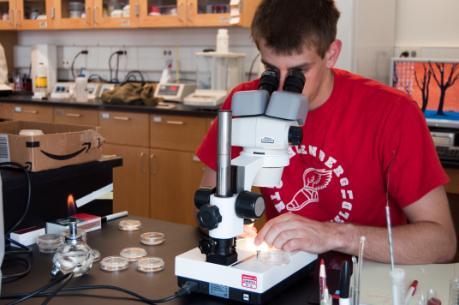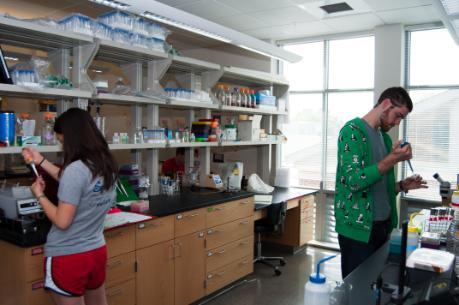Muhlenberg Undergraduate Biology Research Program
Undergraduate students from Muhlenberg and other colleges have been active participants in research conducted in the Muhlenberg Biology Department. Students at Muhlenberg publish their work in scholarly journals and have gone on to win competitive national graduate fellowships and acceptance at the nation's top graduate and medical schools, including Harvard, Yale, Stanford, Princeton and Penn. Participation in undergraduate research is now a basic expectation for a student's application for graduate study.
Academic Year Research
Summer Research
Other Opportunities
Descriptions of departmental research programs

Student Research During the Academic Year
You can perform research for academic credit during either academic semester. Anyone can receive 0.5 or 1.0 course unit for performing research by registering for BIO 970 (Independent Study/Research). Most projects culminate in a written or oral presentation. One unit of research may be substituted for an upper-level elective in the Biology major (although not for a 200- or 400-level requirement). Consult your academic advisor for more information. You register using a special form at the Registrar's Office.
An outstanding student may wish to work toward Departmental Honors by conducting research with a Biology Department faculty mentor for two semesters during the senior year.

Student Research During the Summer
You can perform research on a part-time or full-time basis during the summer. In some cases, you may receive a stipend (often $3000 for ten weeks) and receive free housing from the College. Students who are interested in summer research may want to submit an application for an undergraduate summer grant from the Dean of the College for Academic Life. These competitive awards provide free housing and a summer stipend for research carried out in the laboratory of a department faculty member. The Biology Department also offers summer student awards through the Vaughan, Trainer and Neuroscience Research Awards. For these awards, be sure to begin talking to potential faculty mentors late in the preceding Fall semester.
If you are interested in performing research, you should seek out faculty members who would be appropriate mentors for your project at least a half-semester before you want to do research. Faculty often fill their available summer research positions by February or March. You don't need to know exactly what project you want to work on, just some basic ideas of what kind of research interests you. Choose a faculty member with research interests that parallel your own. Your project may be suggested by your faculty member, emerge through conversations with him/her, or develop independently from participation in lab journal clubs. We encourage all students interested in research to read the research descriptions on individual faculty pages in order to find the most appropriate match.
Students of biology may also be interested in the research labs of faculty from the interdisciplinary science majors, including neuroscience, biochemistry, and environmental science. Interested students are encouraged to consult the websites of these programs to learn more about interdisciplinary research on campus.

